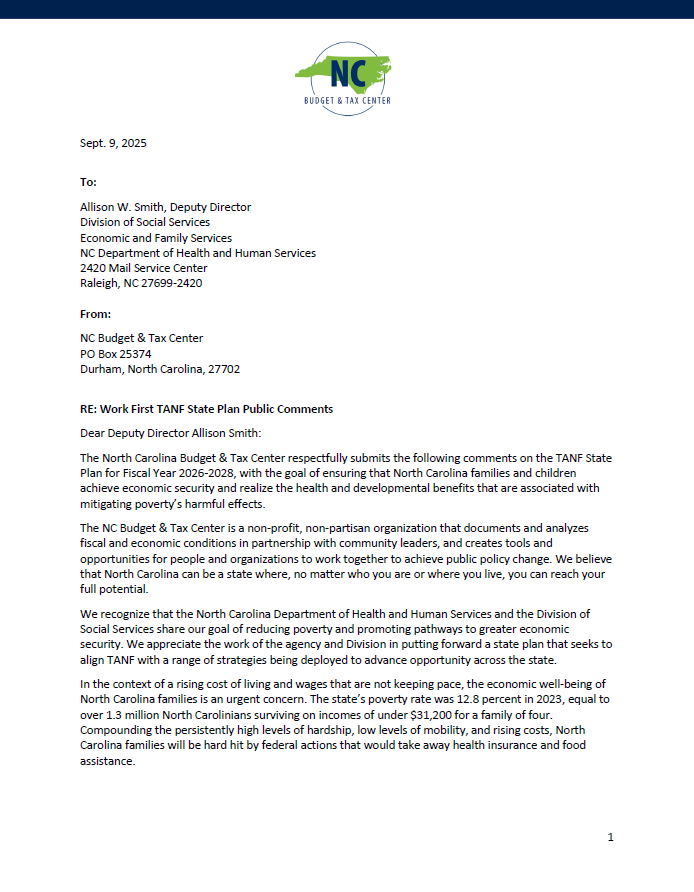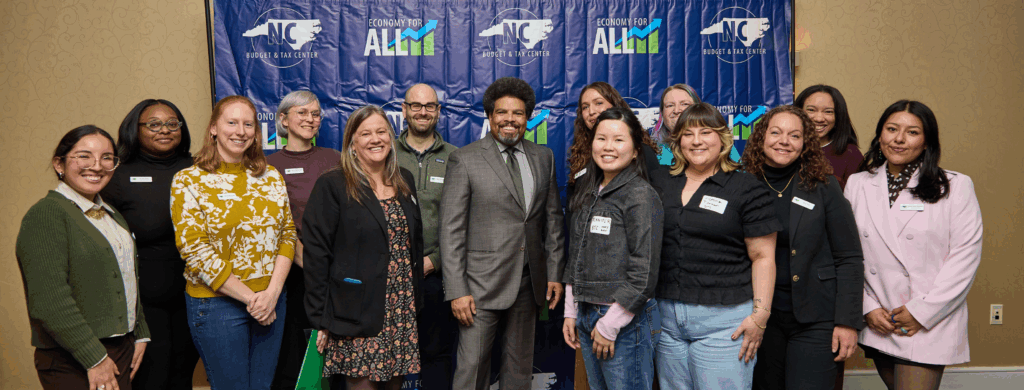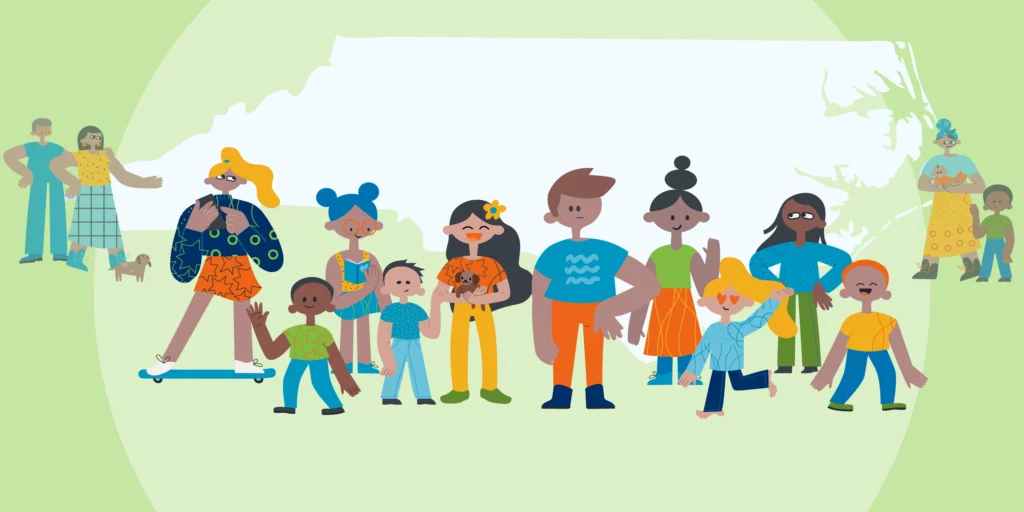Public Comment: Work First TANF State Plan

To:
Allison W. Smith, Deputy Director
Division of Social Services
Economic and Family Services
NC Department of Health and Human Services
2420 Mail Service Center
Raleigh, NC 27699-2420
From:
NC Budget & Tax Center
PO Box 25374
Durham, North Carolina, 27702
RE: Work First TANF State Plan Public Comments
Dear Deputy Director Allison Smith:
The North Carolina Budget & Tax Center respectfully submits the following comments on the TANF State Plan for Fiscal Year 2026-2028, with the goal of ensuring that North Carolina families and children achieve economic security and realize the health and developmental benefits that are associated with mitigating poverty’s harmful effects.
The NC Budget & Tax Center is a non-profit, non-partisan organization that documents and analyzes fiscal and economic conditions in partnership with community leaders, and creates tools and opportunities for people and organizations to work together to achieve public policy change. We believe that North Carolina can be a state where, no matter who you are or where you live, you can reach your full potential.
We recognize that the North Carolina Department of Health and Human Services and the Division of Social Services share our goal of reducing poverty and promoting pathways to greater economic security. We appreciate the work of the agency and Division in putting forward a state plan that seeks to align TANF with a range of strategies being deployed to advance opportunity across the state.
In the context of a rising cost of living and wages that are not keeping pace, the economic well-being of North Carolina families is an urgent concern. The state’s poverty rate was 12.8 percent in 2023, equal to over 1.3 million North Carolinians surviving on incomes of under $31,200 for a family of four. Compounding the persistently high levels of hardship, low levels of mobility, and rising costs, North Carolina families will be hard hit by federal actions that would take away health insurance and food assistance.
These federal cuts will raise costs for families, and state policymakers should take action to protect families from the deepest hardship. One step that North Carolina can take is to act quickly to strengthen TANF, so that the program better provides the income support necessary to help families move out of poverty.
North Carolina falls woefully behind the national average in providing direct cash assistance to families struggling to get out of poverty. In 2022, North Carolina spent just 5 percent of TANF funds on basic cash assistance, compared to 23 percent of funds spent on basic assistance nationally. Furthermore, the program reaches only a very small portion of families experiencing hardship: Only 4 out of 100 families with children living in poverty in North Carolina receive TANF, while nationally 20 out of 100 such families receive TANF.
North Carolina has the financial capacity to enact program changes that would help TANF reach and support more families. North Carolina does not fully expend its TANF block grant each year. As of FY 2022, North Carolina had accumulated $55 million in unspent funds that reflect roughly 18 percent of the state’s TANF block grant. In 2023, North Carolina ended the year with about $42 million in federal funds that were committed to a specific purpose but remained unspent; these unspent funds appear to include $10.6 million allocated to Work First Family Assistance.
Other states have taken advantage of underutilized block grant funds to make improvements to their TANF program: In Kentucky, researchers found that due to a similar context of declining enrollment and eroding supports, the state was able to afford robust improvements to the state’s TANF program after years of neglect.
As you finalize the TANF State Plan for FY 2026-2028, we urge you to consider the following changes to improve the program’s ability to support people as they work to get out of poverty and withstand hardship.
First, it is important to ensure that families in need are not barred from accessing the program because of outdated and harmful barriers that are not based on the best available evidence of what people need to successfully move out of poverty. North Carolina can make the following changes to remove barriers that prevent individuals in need from accessing cash assistance:
- Remove the family cap. North Carolina blocks children born into households already receiving TANF from receiving income support. Only 6 states have yet to remove family cap policies, with Tennessee becoming the latest state to remove theirs in 2024.
- Increase waivers for domestic violence survivors. Zero TANF families received a Domestic Violence Exemption in North Carolina in 2022 and 2023. North Carolina could learn from the reforms in Pennsylvania, which updated its Family Violence Policies and Procedures, created a new verification form, and has one of the highest waiver rates in the country at 4.4 percent.
Second, the current design of TANF rules makes it difficult to sustainably move out of poverty. North Carolina can reduce the occurrence and severity of benefits cliffs in the TANF program by making income limits more flexible and making asset limits less restrictive.
- Increase the earned income disregard to 100 percent for the first 3 to 6 months and 50 percent for the remainder. North Carolina should increase its earned income disregard (currently 27.5 percent for all months, one of the lowest in the nation) to encourage individuals to take on higher-paying jobs or work more hours without fear of losing a significant amount of support. Nine states have 100 percent earned income disregards for a certain amount of time after earnings increase (most commonly 3-6 months).
- Remove asset limits. Nine states have no asset limit, including Alabama, Louisiana, Ohio, and Virginia. North Carolina’s current asset limit is quite low ($3,000) — the state could double the asset limit to $6,000 and still be in the middle of the distribution relative to other states’ limits.
- Establish a subsidized employment program to directly connect people with work opportunities. TANF work programs focus on getting participants employed as quickly as possible, with the result that individuals leave TANF for work in unstable, low-wage jobs that leave them with earnings far below the federal poverty line. North Carolina can use subsidized employment — in which public funds temporarily pay some or all of workers’ wages — to support the transition to economic security and prevent a return to the low-paying work that led families to TANF in the first place. Evaluations of local- and state-level subsidized employment programs have found positive impacts on wages for participants.
Finally, lessons from TANF over the years have shown that punitive monitoring of behavior has limited overall return on the economic security of families and is costly to administer. The following recommendations would ensure that reasonable reporting and monitoring does not undermine the program’s goal of ensuring families with children have the income to make ends meet.
- Reform full family sanctions. North Carolina takes away the entire family’s benefit if a parent fails to meet the work requirements. North Carolina could take administrative action (as Oregon has) to eliminate full family sanctions by designating 75 percent of the grant for children in the household — which cannot be taken away — and 25 percent for adults. At least 10 states and Washington, DC, have eliminated full family sanctions.
- Adjust “pay after performance” provisions. Pay after performance is a relatively unique policy feature of North Carolina’s TANF program and it is an outlier compared to other states in the country. North Carolina should adjust these provisions to allow the flexibility necessary to ensure that people struggling with the barriers presented by poverty are supported to achieve real and lasting financial security, rather than unintentionally pushed into deeper poverty by arbitrarily stringent program requirements that interfere with their good faith efforts to comply.
- Expand definition of good cause reasons for not meeting program requirements. North Carolina should specifically name domestic violence, natural disaster, and eviction notice as good cause considerations for exemptions from requirements.
With these changes, the administration would make significant progress in improving the TANF program to meet the goal of helping North Carolinians move out of poverty. We are also committed to urging the North Carolina General Assembly to add state dollars to the TANF program in this critical moment. State lawmakers can ensure the adequacy of TANF funds by benchmarking benefit levels to at least 40 percent of the federal poverty level. They can do this either by providing General Fund revenue directly to the program or by reducing their reliance on TANF funds for child care and foster care, instead supporting those essential programs with a recurring commitment of General Fund revenue.
We share the goal of achieving greater economic security for families and children. An effective, equitable system that works toward this goal must remove barriers to access, smooth the path for families trying to move out of poverty, and implement evidence-based reforms that are focused on families’ success rather than punishment.
We know that with these reforms to TANF policies, the program will better fulfill its critical role in supporting the well-being of North Carolinians through times of hardship, and we know that federal threats to health care and food assistance make these reforms especially urgent at this time.
Please contact us if you require additional information regarding our comments on the TANF state plan by communicating directly with Alexandra Sirota, [email protected].
Sincerely,
Alexandra Sirota
Executive Director
NC Budget & Tax Center
Sally Hodges-Copple
Public Policy Analyst
NC Budget & Tax Center



